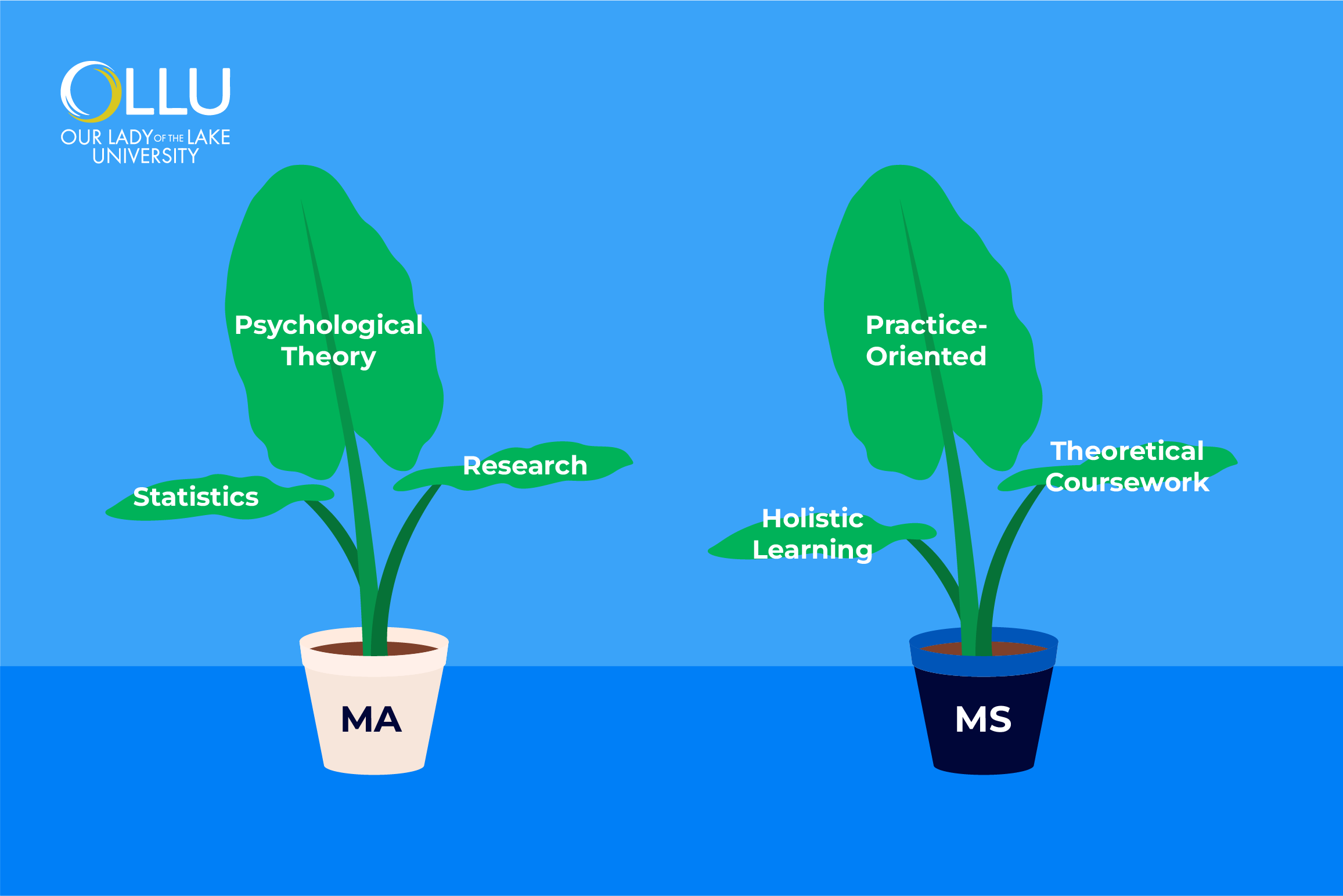MS vs. MA in Psychology: Differences & How to Choose
May 15, 2024

If you've already decided that a master's degree is crucial for the career path you need to take, the next step is deciding what type of master's degree you want to pursue. Master's degrees in psychology can take the form of a Master of Arts (MA) and Master of Science (MS) degree program. While you'll receive the same quality psychology education with either path, you must choose one that best aligns with your career goals.
In this guide, we’ll explore MA vs MS in psychology, potential career paths, skills gained during the program, and how to choose between them. Furthermore, we’ll explore the factors that make these graduate programs in psychology worthwhile, helping you make an informed decision about your future.
What Is a Master of Arts (MA) in Psychology?
An MA in psychology is a graduate-level degree that focuses on advanced concepts in psychology and prepares you for a career in psychology. It typically focuses on the theoretical and applied aspects of psychology. MA programs in psychology cover a wide range of concentrations, such as:
- Clinical Psychology,
- Forensic Psychology,
- Social Psychology,
- Social Psychology,
- Child Development,
- Experimental Psychology,
- Industrial-Organizational Psychology.
The coursework in an MA in psychology program varies depending on the specialization, but it often includes foundational courses in psychological theory, statistics, and research methods. The program tends to have more social and cultural-oriented courses that emphasize social and cultural issues when approaching psychological problems.
What Is a Master of Science (MS) in Psychology?
An MS in psychology is another type of graduate-level education in psychology that entails advanced study of psychology. MS programs typically focus on the scientific and research aspects of psychology.
Like MA programs in psychology, MS programs cover a wide range of focus areas, such as:
- Marriage and Family Therapy,
- Clinical Psychology,
- Forensic Psychology,
- Child Development,
- Experimental Psychology,
- School Psychology.
Although coursework depends on the institution and specialization, MS programs tend to have more math and research-oriented classes that emphasize data analysis and statistics and apply the scientific experimentation method to psychological theory.
What Can You Do with an MA or MS in Psychology?
Graduate education in psychology generally covers human behavior, theory, and research, so career opportunities are diverse. Regardless of earning an MA or MS degree, you can work in the fields such as:
- Human Resources (HR),
- Healthcare,
- Education,
- Government,
- Law Enforcement,
- Social Service.
Moreover, you can also work in various psychology branches, such as:
- Clinical psychology, working with clients with mental health issues;
- Educational psychology, supporting children and young adults in schools and other academic settings;
- Neuropsychology, helping patients with brain injuries and diseases;
- Occupational psychology, assisting companies identify ways in which they can support employees.
However, earning an MA or MS can lead to different career paths within the field. An MA can lead to a career as a counselor, HR officer, communications officer, industrial-organizational psychologist, and more.
On the other hand, an MS can lead to a career as a research psychologist, data analyst, school psychologist, forensic psychologist, clinical psychologist, etc.
Skills Gained from an MA or MS in Psychology
Both an MA and an MS in Psychology will provide you with diverse skills applicable to various careers within the field. Some of them are:
- Critical Thinking: Though critical thinking skills are crucial in both programs, the focus is different. MA programs help you develop critical thinking skills to diagnose and treat clients. Conversely, MS programs help you utilize these skills to design research and interpret existing literature.
- Research Skills: While MS programs tend to be more research-oriented, MA programs also include courses in research methods. These courses allow you to develop research skills to further your knowledge in the field or research different treatment methods to enhance client outcomes.
- Empathy: Regardless of the degree type, graduate studies provide the perfect avenue to hone empathy and compassion. These traits allow you to understand your client's feelings and find the best way to approach them.
- Cultural Competence: Although present in MS programs, MA programs tend to focus more on social and cultural-oriented courses, allowing you to develop cultural competence abilities. Cultural competence is paramount to creating an inclusive and welcoming environment when working with clients.
Difference Between MA and MS in Psychology

Many schools offer MA and MS options for earning a degree in a specialization in psychology. So, you'll be able to earn an MA or MS in forensic psychology, clinical psychology, school psychology, and more. While there's overlap in the coursework, there are clear distinctions between the two routes.
One of the critical differences between MA and MS programs is the curriculum, with MS programs focusing more on hard science courses. On the other hand, social and cultural courses are more common in MA programs. Moreover, while it's not a rule, you're likely to find that MS degrees require a thesis, whereas MA degrees tend to not have a thesis as a requirement to graduate.
Similarly, the focus area of these two degrees also differs. In general, MA programs place a stronger emphasis on the field's theoretical and practical application aspects. Conversely, an MS program sticks more closely to the field's scientific basis and emphasizes research and hard data.
Lastly, pursuing one or the other degree can also impact your career outcomes. An MS degree offers you to emerge into careers within professional psychology once you complete your PhD program, whereas a terminal MS degree will prepare you for entry-level careers within mental health and forensic psychology careers. On the other hand, an MA degree will prepare you to work as a counselor or therapist in schools, mental health, and the private industry.
How Do I Choose Between an MA and an MS in Psychology?
When choosing between an MA and an MS in psychology, you should consider factors such as career goals, interests, and desired skills.
If you're interested in pursuing a career in clinical and counseling psychology or developmental psychology, an MA will provide you with the necessary knowledge and skills to practice, whereas an MS will suit your career goals better if you want to pursue roles in academia or marketing.
Another factor to consider is your interests. If you enjoy working with patients and have strong interpersonal skills, an MA program focusing on clinical or counseling psychology would align well with your interests and strengths. On the other hand, if you excel in research methods and data analysis, an MS program would be a better match.
Lastly, you should also factor in what you want to get out of graduate studies. If you want to develop research skills, data analysis and interpretation, and problem-solving abilities, an MS in psychology would be better for you. On the other hand, an MA may be better for you if you want to develop teamwork skills, critical reasoning, and clinical skills.
In this sense, to find the best master's program in psychology that aligns with your goals and interests, you should:
- Browse lists to get an idea of which universities have psychology programs and how they rank. Reliable resources include GradSchools, Princeton Review, and U.S. News rankings.
- Explore scholarly journals to gather information on the leading scholars in the field.
- Reach program offices directly to gather program information about courses, costs, faculty, financial aid, and application forms. You can request more information about our programs here.
Is an MA or MS in Psychology Worth It?
Whether or not these degrees are worth it depends on your personal circumstances and aspirations. However, both degree programs are excellent paths for achieving your academic and professional goals. Overall, you can expect an MA or an MS in psychology to help you:
- Gain a better understanding of human behavior and the psychological factors that influence it;
- Build the skills to work with people of all ages or to conduct qualitative research;
- Become qualified to work in various settings like mental health facilities, businesses, government agencies, and schools.
On the other side of the coin, there are potential drawbacks to earning an MA or MS degree, such as;
- Cost of Education: Pursuing an MA or an MS in psychology can be expensive. According to the Education Data Initiative, an MA costs an average of $66,950, whereas an MS typically costs $57,770.
- Time Commitment: Although generally graduate programs in psychology take around two years to complete if you're a full-time student. However, these programs can take longer if you're a part-time student and have to juggle family and work obligations with school.
But how do you determine if an advanced degree in psychology is right for you? To do so, you should consider factors that influence the value of the degree, such as salary potential and the job market.
After earning a graduate degree in psychology, you can expect a salary of $92,740. The salary depends on specialization, with the highest-paid one being industrial-organizational psychology, with an average salary of $154,380.
Similarly, you should consider the job market, which is generally favorable for psychologists. The BLS reports stable 6% employment growth over the decade. Employment growth within the field varies, with clinical and counseling psychologists leading with an 11% growth.
Conclusion
Both MA and MS programs are excellent paths to achieving your academic and professional goals. One isn't better than the other, as the best program for you is the one that best prepares you for your future.
When choosing between an MA or MS program, consider your long-term goals, where your interests lie, and what you want to get out of the program. Your journey to becoming a psychology professional begins with choosing the right program, so start exploring today!
Frequently Asked Questions
Can you get a Master's in Psychology with a different bachelor's?
Yes, you can get a master's degree in psychology with a bachelor's degree in another subject. However, you may need to complete prerequisite courses before enrolling in a graduate program.
What degree do most mental health counselors have?
Most mental health counselors have a master's degree in counseling, psychology, or social work.